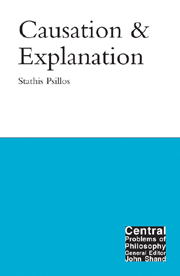Introduction
Summary
The birth of our daughter was the cause of great happiness to my wife and me. This explains why I decided to dedicate this book to her. It also caused certain changes in our life (for instance, that our study at home had to be converted to a nursery). It brought about a delay in the completion of the current book, which (hopefully) explains why this book might well be a bit better than it would have been had I rushed to finish it. It is because of her birth that I have come to realize how challenging and exciting parenthood is. And this explains my recent interest in books about babies. And so on and so forth.
Causal and explanatory talk is so pervasive in our everyday life, as well as in the sciences, that its importance can hardly be exaggerated. We search for causes and look for explanations in order to understand how and why things around us are the way they are, or behave and change in certain ways. But we also search for causes and look for explanations in order to intervene in the course of nature (or in the course of events, in general) and bring certain effects about or prevent others from occurring. We are interested in causation and explanation because we are thinkers and agents, because we are both theoretical and practical beings.
- Type
- Chapter
- Information
- Causation and Explanation , pp. 1 - 16Publisher: Acumen PublishingPrint publication year: 2002

